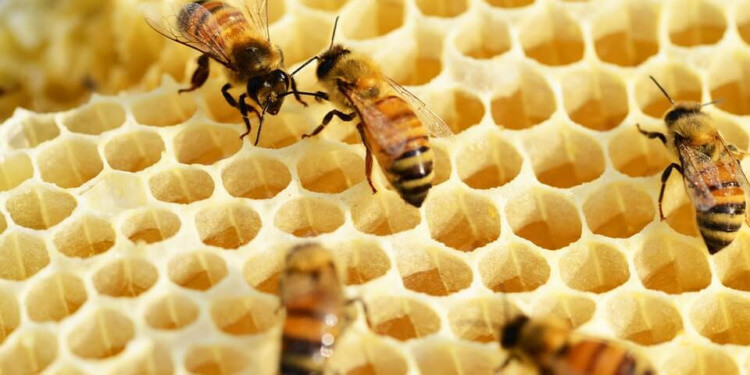Firstly, Why Are Bees So Important?
Besides the health benefits that bees offer to us, the function of bees is also very important for the environment. Bees pollinate our plants, which means that they carry pollen between plants of different sexes to fertilize them, or even between different parts of the same plant, which help plants to reproduce. That’s why bees are vital for the preservation of ecological balance and biodiversity in nature. Bees provide one of the most recognizable ecosystem services, which makes food production possible: a third of the world’s food production depends on bees.
The Health Benefits
Honey
Honey is produced by honey bees using the nectar of flowering plants. The smell, color, and taste of honey vary based on the type of flowers it’s made from; there are countless varieties available. Honey has a number of potential health benefits:
-
- It’s rich in health-promoting plant compounds known as polyphenols.
- Honey is antibacterial and antifungal: honey can kill harmful bacteria and fungi.
- High-quality honey — which is minimally processed, unheated, and fresh — contains many important bioactive plant compounds and antioxidants. Tip: darker varieties tend to offer more antioxidants than lighter varieties.
- It also serves as a wound-healing agent: honey is acidic, which means it can release oxygen from a wound and promote its healing.

Organic honey in the honeycomb of Eco Impakter contains all the main amino acids and vitamins.
However, be aware that processed honey is heated at high temperatures to kill off yeast cells and increase the honey’s shelf life. As a consequence, a lot of honey available in stores has less nutritional value because of this process. Impakter Eco has various types of high-quality organic honey available using the best sustainability practices to preserve bees and respect the environment.
Bee Pollen
Bee pollen is a mixture of flower pollen, nectar, enzymes, honey, wax and bee secretions. It is known to be a superfood due to its high nutritional and vitamin content: it’s considered to be one of nature’s most complete foods as it contains nearly all nutrients required by our body. The list of health benefits is as follows:
-
- It contains over 250 biologically active substances, including proteins, carbs, lipids, fatty acids, vitamins, minerals, enzymes and antioxidants.
- Bee pollen contains a wide variety of antioxidants, such as flavonoids, carotenoids, quercetin, kaempferol and glutathione.
- Bee pollen consists of several compounds that can reduce inflammation and swelling.
- Similar to honey, bee pollen has anti-inflammatory and antioxidant properties, which can assist your body in wound healing.
Shopping tip: BeeSweet offers bee pollen cultivated in a highly sustainable and cruelty-free way. BeeSweet’s bee culture is made in total respect for the animals and mother earth. With multiple different flavours, there is an option for everyone!
Beeswax
And last, but not least: the benefits of beeswax. It is edible, and it’s packed full of vitamins and nutrients. You can eat the whole honeycomb; this includes the waxy cells and the honey inside of it. Besides eating beeswax, it’s also great to use on your skin: beeswax is antibacterial, rich in vitamin A, softens the skin, and is used for healing skin. Overall, a great natural source to use in your daily skincare routine!
Try for Yourself!
A great way to include bee pollen and honey in your daily diet is to add them to a smoothie. The following recipe is a delicious, healthy, and easy bee pollen mango smoothie.
Ingredients

- 2 cups freshly squeezed orange juice or about 4 oranges, peel and pits removed
- Half a mango
- 1-2 tablespoons bee pollen
- 1 tablespoon honey
- 1 banana
- 10 almonds
- 1/4 teaspoon cardamom
- 1/4 teaspoon cinnamon
- 1/2 teaspoon turmeric
- Pinch of pepper
-
Blend everything in a blender until smooth.
-
Sprinkle some cinnamon on top and garnish with a bit of extra bee pollen.
-
Drink and enjoy it!
Editor’s Note: The opinions expressed here by Impakter.com contributors are their own, not those of Impakter.com. — Featured Photo: Bees on a Beehive Source: Wixstatic











